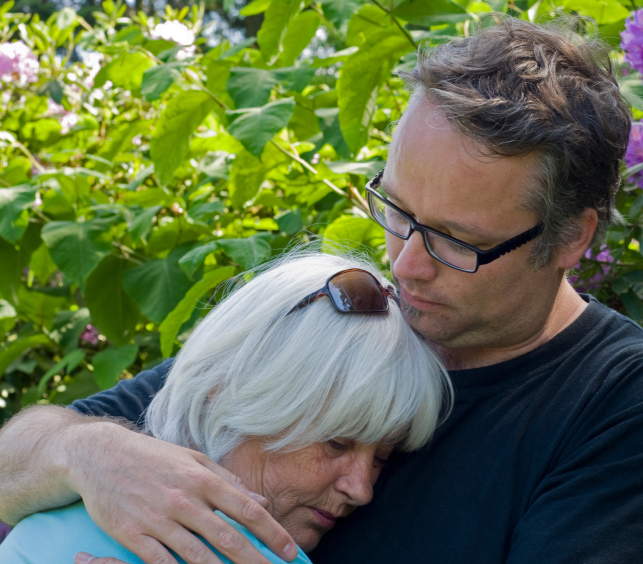Why Patients Live Longer with Hospice?

Patients often live longer with hospice care because it provides a holistic, compassionate approach that goes beyond traditional medical treatment. Hospice care is designed to support not only the physical needs of individuals with life-limiting illnesses but also their emotional, spiritual, and social well-being. By addressing these diverse needs, hospice care creates a nurturing environment where patients can experience a higher quality of life, reduced stress, and the comfort of knowing they are fully supported. This focus on comprehensive care often has positive effects on their overall health and well-being, sometimes leading to extended life.
The hospice team consists of a diverse group of trained professionals and dedicated volunteers, including skilled nurses, hospice aides, social workers, therapists, chaplains, bereavement coordinators, a hospice medical director, and specially-trained volunteers. Each team member brings unique expertise to the care plan, ensuring that every aspect of a patient’s health is attended to. Nurses and aides manage pain and other symptoms, providing comfort and preventing unnecessary suffering. Social workers help patients and families navigate emotional and logistical challenges, ensuring they feel supported and informed. Chaplains provide spiritual guidance, whether it’s through prayer, meditation, or simple companionship, helping patients find peace and purpose. Additionally, therapists work with patients to manage physical discomfort and improve mobility, which can enhance their daily experiences and sense of independence.
By working collaboratively with patients, their families, and the patient’s primary physician, the hospice team creates a personalized care plan that aligns with the patient’s goals and values. This individualized approach means that patients receive treatments and support that are most meaningful to them, whether it’s focused on managing pain, spending time with loved ones, or pursuing cherished activities. Rather than undergoing aggressive treatments that may lead to additional physical stress and discomfort, hospice care empowers patients to live in the way that feels best for them. In turn, this choice to prioritize comfort and well-being can reduce stress on the body, potentially leading to longer life expectancy.
Research has shown that hospice patients often experience fewer hospitalizations, which allows them to avoid the risks and complications associated with frequent emergency care. By providing symptom management and proactive care in the comfort of their own homes, hospice reduces the need for disruptive hospital visits. This stability allows patients to maintain a consistent, peaceful environment that fosters relaxation and healing. Being surrounded by familiar faces, cherished belongings, and a supportive care team creates a sense of security that can improve both mental and physical health outcomes.
Another unique benefit of hospice is the strong support network it offers to both patients and their families. Families often feel empowered by the guidance and resources provided by hospice professionals, who help them understand their loved one’s needs and how to provide the best care possible. This reduces the emotional burden on families, enabling them to focus on creating meaningful memories rather than feeling overwhelmed by caregiving responsibilities. Knowing that their loved one is receiving high-quality, compassionate care also alleviates stress, which positively affects everyone involved.
In summary, patients often live longer with hospice because it creates an environment centered on comfort, compassion, and individualized care. By focusing on quality of life, managing symptoms effectively, and providing emotional and spiritual support, hospice enables patients to live each day fully and peacefully. This comprehensive care approach not only improves patients’ well-being but also contributes to a potentially extended life, underscoring hospice’s unique role in enhancing both the quality and length of life.”
Why Hospice Offers A Better Quality of Life

Hospice care offers a transformative approach to enhancing quality of life for individuals facing life-limiting illnesses, focusing on comfort, dignity, and holistic support rather than curative treatments. When someone is diagnosed with a terminal condition, the primary goal often shifts from aggressive treatments to achieving the highest possible quality of life for the time remaining. Hospice plays a unique role in meeting this need by addressing not only physical symptoms but also emotional, spiritual, and social aspects of a patient’s well-being.
One of the most significant challenges for patients with life-limiting illnesses is managing symptoms and side effects, which can have a profound impact on their day-to-day comfort and overall quality of life. Treatments for serious conditions can bring about a range of unpleasant symptoms, including pain, nausea, appetite loss, and difficulty breathing. These physical issues, combined with the emotional toll of facing a serious illness, can leave patients feeling overwhelmed and disconnected. Hospice care is uniquely equipped to tackle these challenges, as its central focus is to reduce suffering and provide comfort in every form.
Pain management is often a top priority for hospice teams, who work with patients to control discomfort and improve their sense of peace. Skilled hospice nurses and doctors use a combination of medications, therapies, and non-medical interventions to alleviate pain, allowing patients to focus on meaningful experiences rather than the burden of physical distress. This kind of compassionate pain management not only improves physical comfort but also helps reduce anxiety and fear, enabling patients to live more fully each day.
Beyond physical pain, many patients experience additional symptoms such as nausea, poor appetite, and weight loss, which can further diminish their quality of life. Hospice teams use various interventions to address these issues, often adjusting medications, recommending dietary changes, or introducing therapies that can ease these discomforts. By working with patients to improve appetite and reduce nausea, hospice care helps individuals maintain strength and energy, which is essential for engaging in daily activities and spending time with loved ones. This can be especially meaningful as patients seek to make the most of each day with those who matter most to them.
Hospice care also recognizes the critical importance of mental and emotional well-being. The emotional impact of a life-limiting illness can lead to feelings of depression, anxiety, and isolation, all of which can affect a patient’s ability to find joy and peace. Hospice includes social workers, counselors, and chaplains who provide emotional and spiritual support tailored to the individual’s beliefs and needs. These professionals create a safe, compassionate space for patients and families to express their fears, process difficult emotions, and find moments of peace. Addressing these emotional concerns allows patients to approach their remaining time with a sense of purpose, closure, and even personal growth.
A distinctive aspect of hospice is its emphasis on family and loved ones. Recognizing that a patient’s well-being is closely tied to their family’s support and comfort, hospice teams offer resources and guidance to family members as well. Hospice staff provide family counseling, grief support, and education, helping loved ones feel empowered and prepared. This shared support creates a nurturing environment where families can focus on quality time together, free from the stress and uncertainty that often accompanies caregiving.
In essence, hospice care offers a better quality of life by providing comprehensive, patient-centered support that goes beyond just medical needs. It helps patients manage physical symptoms, supports emotional well-being, and fosters meaningful connections with loved ones. By prioritizing comfort, dignity, and peace, hospice allows individuals to live fully and meaningfully, making each day a valuable part of their journey.
What Support Can Patients and Families Expect?



3. 24/7 ACCESS AND SUPPORT Hospice care is available around the clock, 24/7. Patients and families can reach out at any time—day or night, weekday or weekend—to connect with a hospice team member.

Easing Fears and Finding Meaning In Life’s Final Chapter

Facing the end of life can bring up profound fears and anxieties, both for those who are terminally ill and for their loved ones. These fears are often rooted in deeply personal concerns: the fear of pain or suffering, the fear of dying alone, or even existential worries about what—if anything—lies beyond this life. Many wonder whether their lives had meaning or if they’ll be remembered by those they love. These fears, while universal, can be isolating, and addressing them with empathy is one of hospice’s core missions. Through the compassionate care of social workers, chaplains, and the entire hospice team, patients and families find emotional support that allows them to confront these worries and ultimately discover peace and acceptance.
Hospice social workers and chaplains play a key role in helping patients and families explore the underlying causes of their fears. Rather than offering generic comfort, they take time to understand each person’s unique perspective, life story, and sources of anxiety. For instance, a patient might fear dying alone, and this fear could stem from a lifetime of valuing close family connections. In other cases, a patient may dread suffering, worrying that pain will overshadow their final moments. Others may struggle with existential concerns—wondering if they’ll cease to exist, questioning if their lives had purpose, or fearing the unknown that awaits. By working through these thoughts openly, patients often find relief and deeper understanding, which enables them to approach the end with a sense of calm.
Hospice professionals are skilled in creating a safe, compassionate space where these fears can be voiced and explored without judgment. Social workers are trained to listen carefully, helping patients identify the specific worries weighing on their minds. Rather than offering quick reassurances, they support patients in processing these feelings and validating that these concerns are normal and understandable. Social workers can also provide tools for coping with fear, such as breathing exercises, mindfulness techniques, and positive visualization. By helping patients feel heard and respected, social workers guide them towards acceptance and a sense of agency over their final journey.
Chaplains in hospice care offer spiritual support that respects each person’s beliefs, whether religious, spiritual, or secular. For some, addressing fears at the end of life involves reflecting on faith, the afterlife, or seeking spiritual peace. Chaplains provide a gentle, compassionate presence, guiding patients through prayers, meditation, or discussions about spirituality. For those who do not hold religious beliefs, chaplains can offer existential counseling, helping patients contemplate life’s meaning and find comfort in memories, family connections, and personal values. They help patients explore any unfinished business, regrets, or unresolved conflicts that may contribute to fear, encouraging them to seek forgiveness, express gratitude, and reflect on their life’s impact.
This focus on addressing fears has a profound effect on quality of life at the end of life. By easing mental and emotional burdens, hospice care supports patients in experiencing their final days with greater peace and comfort. This not only reduces anxiety but can improve physical symptoms as well. Research has shown that anxiety and pain are closely linked, and by reducing fear, patients often experience reduced pain and physical tension. Hospice’s approach, therefore, supports both the mind and the body, recognizing the deep connection between emotional and physical well-being.
The impact of this compassionate support extends to family members as well. Family members are often deeply affected by a loved one’s fears, and they, too, may carry their own worries and anxieties about the impending loss. Hospice staff provide family members with resources and counseling to help them understand what their loved one is going through and to support them in creating an environment of peace and comfort. Social workers can help families communicate openly, share meaningful moments, and focus on the positive aspects of this final chapter, enabling them to create lasting memories that bring comfort long after their loved one is gone.
Through their work in easing fears, hospice staff ultimately help patients and families find meaning in life’s final chapter. When fears are addressed and alleviated, patients are often able to connect with loved ones in new, profound ways. Some patients take the opportunity to reflect on their life’s journey, share stories, impart wisdom, and strengthen bonds with family members. This process brings a sense of closure and satisfaction, allowing patients to approach their final days with acceptance and peace.
In essence, hospice’s commitment to addressing fears at the end of life honors the emotional and spiritual needs of patients and families. By creating a space for open dialogue, reflection, and understanding, hospice care supports patients in finding peace, comfort, and even moments of joy in their final journey. This compassionate approach transforms the end of life into a meaningful experience, where fear is replaced by peace and loved ones find strength and solace together.
